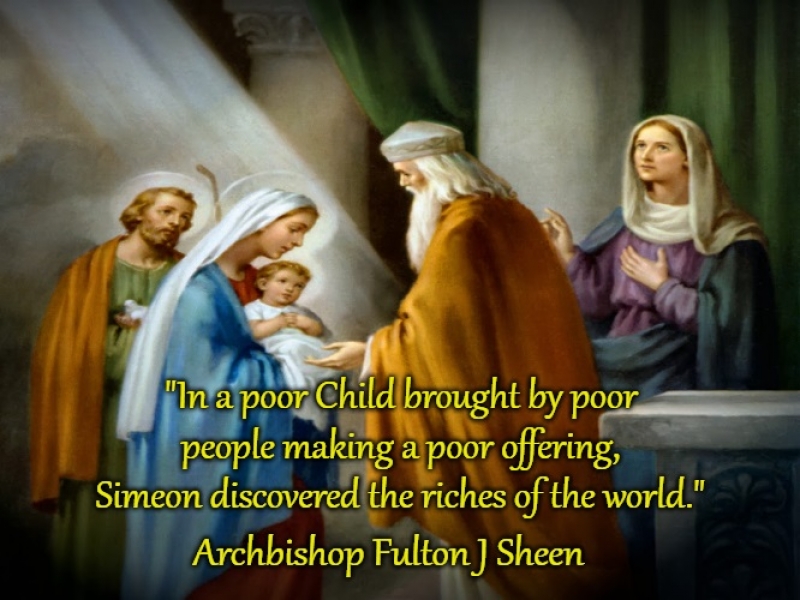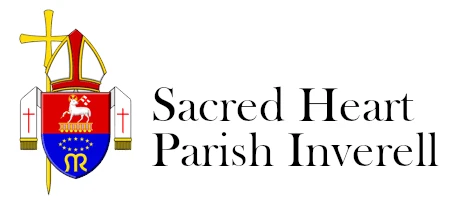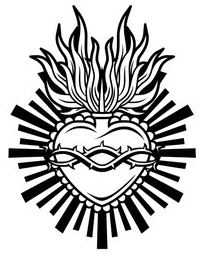Solemnity of the Holy Family of Jesus, Mary & Joseph (Year B) - 31 December
31st December 2023

Solemnity of the Holy Family of Jesus, Mary & Joseph (Year B) - 31 December
“See how Jesus, Mary and Joseph loved one another, all three, how happy they looked, with what kindness and gentleness they spoke to each other. In our little family, it must be the same.” - St Jeanne Jugan
A reflection on today's Gospel by the Venerable Archbishop Fulton J Sheen:
"We find here another instance of how God in the form of man shared the poverty of mankind. The traditional offerings for purification were a lamb and a turtledove if the parents were rich, and two doves or two pigeons if they were poor. Thus the mother who brought the Lamb of God into the world had no lamb to offer—except the Lamb of God. God was presented in the temple at the age of forty days. About thirty years later He would claim the temple and use it as the symbol of His Body in which dwelt the fullness of Divinity. Here it was not the Firstborn of Mary alone Who was presented, but the Firstborn of the Eternal Father. As the Only Begotten of the Father, He was now presented as the Firstborn of a restored humanity. A new race began in Him.
"The character of the man in the temple whose name was Simeon and who received the Child […] was like a sentinel whom God had sent to watch for the Light. When the Light finally appeared, he was ready to sing his Nunc Dimittis. In a poor Child brought by poor people making a poor offering, Simeon discovered the riches of the world.
"Simeon’s hymn was an act of adoration. The song of Simeon was like a sunset in which a shadow heralds a substance. It was the first hymn by men in the life of Christ. Simeon, though addressing Mary and Joseph, did not address the Child. It would not have been fitting to give his blessing to the Son of the Highest. He blessed them; but he did not bless the Child.
"After his hymn of praise he addressed himself only to the mother; Simeon knew that she, and not Joseph, was related to the Babe in his arms. He saw furthermore that there were sorrows in store for her, not for Joseph.
"It was as if the whole history of the Divine Child were passing before the eyes of the old man. Every detail of that prophecy was to be fulfilled within the lifetime of the Babe. Here was a hard fact of the Cross, affirmed even before the tiny arms of the Babe could stretch themselves out straight enough to make the form of a cross. The Child would create terrible strife between good and evil, stripping the masks from each, thus provoking a terrible hatred. He would be at once a stumbling block, a sword that would divide evil from good, and a touchstone that would reveal the motives and dispositions of human hearts. Men would no longer be the same once they had heard His name and learned of His life. They would be compelled either to accept Him, or reject Him. About Him there would be no such thing as compromise: only acceptance or rejection, resurrection or death. He would, by His very nature, make men reveal their secret attitudes toward God. His mission would be not to put souls on trial, but to redeem them; and yet, because their souls were sinful, some men would detest His coming.
"It would henceforth be His fate to encounter fanatical opposition from mankind even unto death itself, and this would involve Mary in cruel distress. The angel had told her, 'Blessed art thou among women,' and Simeon was now telling her that in her blessedness she would be the Mater Dolorosa. One of the penalties of original sin was that a woman should bring forth her child in sorrow; Simeon was saying that she would continue to live in the sorrow of her Child. If He was to be the Man of Sorrows, she would be the Mother of Sorrows. An unsuffering Madonna to the suffering Christ would be a loveless Madonna. Since Christ loved mankind so much that He wanted to die to expiate its guilt, then He would also will that His mother should be wrapped in the swaddling bands of His own grief.
"Simeon knew this well, and he told Our Lord’s mother that her Son must suffer because His life would be so much opposed to the complacent maxims by which most men govern their lives. He would act on one soul in one way, and on another in another way, as the sun shines on wax and softens it, and shines on mud and hardens it. There is no difference in the sun, only in the objects on which it shines. As the Light of the World, He would be a joy to the good and the lovers of light; but He would be like a probing searchlight to those who were evil and preferred to live in darkness. The seed is the same, but the soil is different, and each soil will be judged by the way it reacts to the seed. The will of Christ to save is limited by the free reaction of each soul either to accept or reject.
"An Eastern fable tells of a magic mirror that remained clear when the good looked upon it, and became sullied when the impure gazed at it. Thus the owner could always tell the character of those who used it. Simeon was telling His mother that her Son would be like this mirror: men would either love or hate Him, according to their own reflections. A light falling on a sensitive photographic plate registers a chemical change that cannot be effaced. Simeon was saying that the Light of this Babe falling on Jew and Gentile would stamp on each the ineffaceable vestige of its presence.
"Simeon also said that the Babe would disclose the true inner dispositions of men. He would test the thoughts of all who were to encounter Him.
"After saying that He was a sign to be contradicted, Simeon turned to the mother, adding: ‘As for thy own soul, it shall have a Sword to pierce it.’
"She was told that He would be rejected by the world, and with His Crucifixion there would be her transfixion. As the Child willed the Cross for Himself, so He willed the Sword of Sorrow for her. If He chose to be a Man of Sorrows, He also chose her to be a Mother of Sorrows! God does not always spare the good from grief. The Father spared not the Son, and the Son spared not the mother. With His Passion there must be her compassion. An unsuffering Christ Who did not freely pay the debt of human guilt would be reduced to the level of an ethical guide; and a mother who did not share in His sufferings would be unworthy of her great role.
"Simeon not only unsheathed a sword; he also told her where Providence had destined it to be driven. Later on, the Child would say, ‘I came to bring the sword.’ Simeon told her that she would feel it in her heart while her Son was hanging on the sign of contradiction and she was standing beneath it transfixed in grief. The spear that would physically pierce His heart would mystically be run into her own heart. The Babe came to die, not to live, for His name was ‘Saviour.’"
(Life of Christ)
Prayer for the Feast of the Holy Family
God our Father, in the Holy Family of Nazareth You have given us the true model of a Christian home. Grant that by following Jesus, Mary and Joseph in their love for each other and in the example of their family life, we may come to Your home of peace and joy. Amen. Jesus, Mary and Joseph, pray for our families. ???
Food for Thought
Jesus, Mary, Joseph. Three persons to whom we should daily entrust our lives and those of all our friends and family. Each day take a moment to tell the holy family how much you love them, how much you need their assistance and protection.
Plenary Indulgence Available
An indulgence is a remission before God of the temporary punishment due to sins whose guilt has already been forgiven. It is gained by having the right dispositions and performing the prescribed act. Christ has given to His Church the authority to dispense these indulgences which come from the satisfactions of Christ and the saints. (cf. CCC §1471) On the last day of the year a plenary or full indulgence is gained by those who publicly recite the Te Deum and fulfil the following conditions:
Reception of Holy Communion on the same day
Prayer for the holy intentions of the Pope
Sacramental Confession on the same day or within 21 days
A detachment from sin
Te Deum
We praise you, O God:
we acclaim you as the Lord.
Everlasting Father,
all the world bows down before you.
All the angels sing your praise,
the hosts of heaven and all the angelic
powers, all the cherubim and seraphim
call out to you in unending song:
Holy, Holy, Holy,
is the Lord God of angel hosts!
The heavens and the earth are filled
with your majesty and glory.
The glorious band of apostles,
the noble company of prophets,
the white-robed army who shed their blood for Christ,
all sing your praise.
And to the ends of the earth
your holy Church proclaims her faith in you:
Father, whose majesty is boundless,
your true and only Son, who is to be adored,
the Holy Spirit sent to be our Advocate.
You, Christ, are the king of glory,
Son of the eternal Father.
When you took our nature to save mankind
you did not shrink from birth in the Virgin’s womb.
You overcame the power of death
opening the Father’s kingdom to all who believe in you.
Enthroned at God’s right hand in the glory of the Father,
you will come in judgement according to your promise.
You redeemed your people by your precious blood.
Come, we implore you, to our aid.
Grant us with the saints
a place in eternal glory.
Lord, save your people
and bless your inheritance.
Rule them and uphold them
for ever and ever.
Day by day we praise you:
we acclaim you now and to all eternity.
In your goodness, Lord, keep us free from sin.
Have mercy on us, Lord, have mercy.
May your mercy always be with us, Lord,
for we have hoped in you.
In you, Lord, we put our trust:
we shall not be put to shame.


